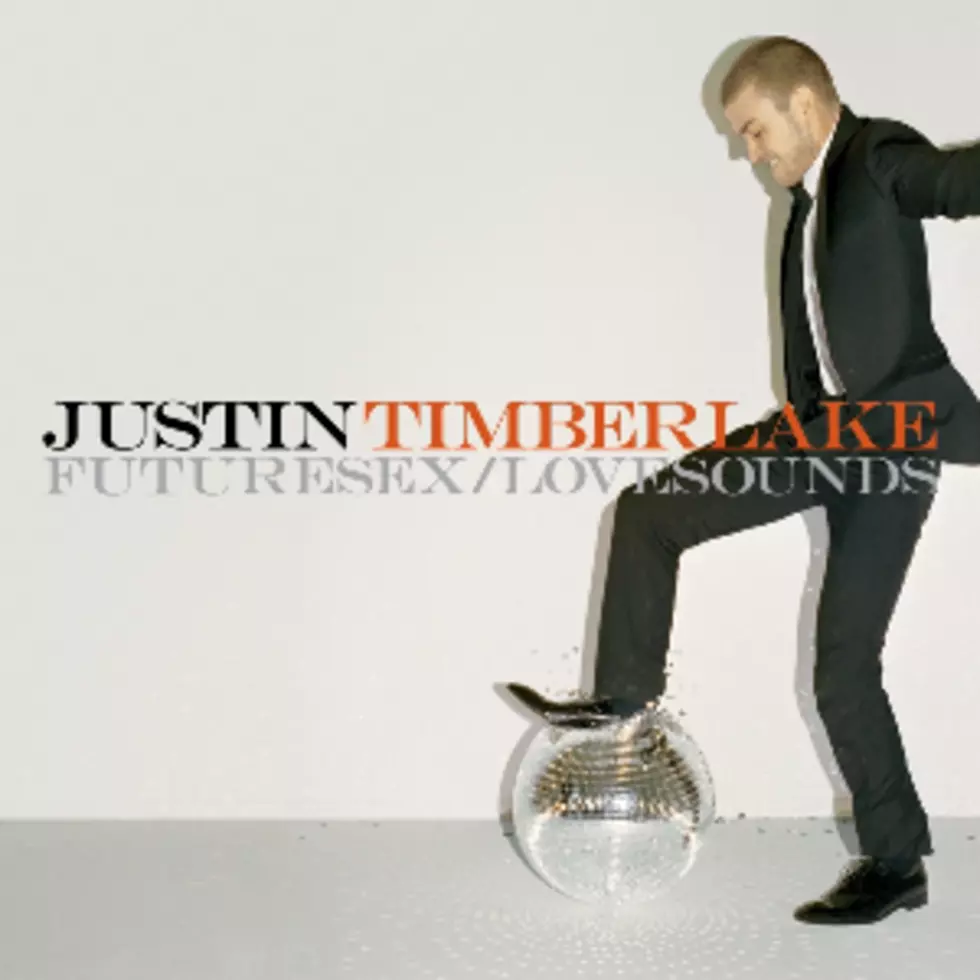
Justin Timberlake’s ‘FutureSex/LoveSounds’ Became His ‘Thriller’
The worlds of pop and R&B have had a sturdy brick wall separating the two genres for quite some time and were almost segregated in a sense. The sound of music may be homogenized in 2016, but in decades prior, it was long understood that although R&B music could be popular among Caucasians and other races, it was ultimately considered a genre for black people, whereas pop was the playground for more melanin-deficient acts.
Over the course of time, few artists have truly been able to straddle the line between the two and achieve acclaim on both sides of the spectrum without alienating the other. A number of artists have been able to cross over and earn fans on each side with their respective style of music, but actually tossing them in a melting pot and creating magic that can not be defined or relegated to one box is the test of a true icon and visionary. The first to accomplish this feat was Micheal Jackson, whose sound would evolve from catchy urban jukebox ditties during the late '70s and early '80s into pop friendly anthems during his run in the late '80s and early '90s, ultimately earning him the distinction of being hailed the "King of Pop." The second would be Justin Timberlake, whose trajectory as a creative was eerily similar to that of Jackson.
Both first found success as the integral cog in the respective machines that were the Jackson 5 and 'NSYNC, acts that would both sell millions of units and serve as blueprints as to what it meant to be an elite boy-band in the '70s and aughts, respectively. Timberlake, like Jackson, was singled out as the clear-cut star of his group, 'NSYNC, who would make a seismic impact with their self-titled album in 1998, which would sell over 11 million copies worldwide. 'NSYNC would also achieve unprecedented success with their sophomore effort, No Strings Attached, which would sell 2.4 million copies in its first week of release in 2000 and stamp them as the undisputed No. 1 boy-band in music.
However, just as Michael would chose to breakout on his own outside of the confines of his group, Timberlake would also take that leap of faith after 'NSYNC's third studio-album, Celebrity, which was released in July of 2001. With 'NSYNC deciding to go on hiatus, Timberlake would quickly transition into a solo career, premiering his debut solo single, "Like I Love You," at the 2002 MTV Music Video Awards. The single, which would peak at No. 11 on the Hot 100, would pave the way for his debut solo effort, Justified, which arrived in November of 2002.
Debuting at No. 2 on the Billboard 200, the album fell short of the initial success of Timberlake's albums as a member of 'NSYNC, moving a successful, yet paltry 439,000 copies in its first week when compared to Celebrity's first week tally of 1,879,495 units sold.
Justified, which saw Timberlake teaming up with producers The Neptunes, and Timbaland for the bulk of the album, was a stark contrast to his previous work with 'NSYNC and was steeped in r&b, which the singer had admitted was the actual music he gravitated to while growing up as a kid in Memphis. Taking a crash course in how to make a definitive R&B album by listening to classics from previous eras, Timberlake and his production team instantly knew they had something unique up their sleeves.
"We picked him up right after he checked into his hotel," Chad Hugo, one half of The Neptunes, shared with MTV News. "We drove around in the car listening to old Earth, Wind & Fire albums, and he was totally with it. The background of those songs is the feeling we wanted to incorporate into the music. He was like, 'Nobody's ever heard anything like that before ... a white boy singing this kind of music.' He didn't care what people would say."
And following his intuitions would pay big dividends, as Justified would yield two more smash singles, "Rock Your Body" and "Cry Me A River," and sell over ten million copies worldwide. Although Justified would net Timberlake Grammy nominations for Best Rap/Sung Collaboration for "Like I Love You," as well as Album of the Year and Best Pop Vocal Album, winning the latter two, Justified would receive mixed-reviews besides its hit singles.
To some, it appeared that Timberlake had relied to much on following the Michael Jackson blueprint rather than creating his own, a critique that the young superstar would address nearly four years later with his wildly anticipated sophomore album, FutureSex/LoveSounds.
A bit unsure of the direction he wanted to take on this musical journey, JT would try his hand working with various producers, until reuniting with Timbaland, whom he worked with on a number of cuts for Justified, including the album's lead-single, "Cry Me A River." Prior to working with Justin Timberlake, Timbaland had already amassed a reputation for bringing out the best in the brightest stars in hip-hop and R&B. After gaining tutelage under DeVante Swing as part of his Swing Mob collective, Timbaland would branch off, first coming to prominence for producing Ginuwine's 1996 hit, "Pony," as well as his platinum debut album, The Bachelor. Next up was Aaliyah, who he was tasked with helping to create a sophomore album that would quiet the controversy around her personal life.
The result would be One in a Million, which would certify Aaliyah as one of the leading young ladies in r&b and become one of the more influential bodies of work of the '90s. With those feathers already under his cap, when the opportunity arose for Timbaland to place his imprint on the sound of an artist that had the potential to be the biggest male crossover star on the planet, it was one he would jump at, full throttle.
Serving as the Quincy Jones to Timberlake's Michael Jackson, Timbo, along with his understudy, producer Danja, would play a key role in crafting the foundation of what FutureSex/LoveSounds would be. Beginning the recording process with the song "What Goes Around... Comes Around," Justin Timberlake would opt to formulate all of the album's lyrics in his head and without committing pen to paper, sans for "(Another Song) All Over Again)."
While Justified would be recorded in the span of weeks, the making of FutureSex/LoveSounds would serve as a more arduous task to complete, and would take nearly a year before all parties were satisfied with the outcome.
Arriving on September 8, 2006, FutureSex/LoveSounds debuted atop the Billboard charts to the tune of 684,000 units sold in its first week. The album's lead single, "SexyBack," an intentional curve-ball meant to prepare listeners for the evolution they would see JT make when listening to the album for the first time. Produced by Timbaland, the song was a stark contrast from anything Justin Timberlake had ever released, with 'NSYNC or solo, and was met with skepticism when he voiced his wish to have it released as the first single from the album. While some executives were concerned that the song would be too much for Timberlake loyalists to digest and were unsure if listeners would connect the song to Timberlake without his trademark falsetto, the singer himself was fully prepared to throw caution to the wind and work off his instincts.
"‘SexyBack,' he knew it was risky for him,” Danja told Entertainment Weekly in 2007. ”He knew he didn’t sound like himself and he’d been gone for a while.” After Jive executive Barry Weiss signed off on the decision, "SexyBack" arrived on July of 2006, two months prior to FutureSex/LoveSounds' release, the single would become both Timberlake and Timbaland's first No. 1 single of their careers, with it locking down the top slot for seven consecutive weeks. Selling over three million copies and winning the award for Best Dance Recording at the 2007 Grammy Awards, it's safe to say that Timberlake's longshot bet turned out to be a winner and the biggest hit of his solo career, up til that point.
Danjahandz, who would be very involved in crafting soundbeds for the album, would help guide Timberlake away from the standard style of R&B that made up the balk of his debut, opting to go with a diverse array of influences to draw inspiration from. "I heard dance and techno and was always interested in it but didn't really know where to go" Danjahandz shared during a 2011 interview with Vibe. "But I went to a club one night and saw that people were losing their mind to these dance tracks. It wasn't really that I wanted to mimic that sound. I just wanted to have that energy and have people going crazy. So I knew the fusion was putting R&B with trance."
An example of what Danja had in mind was manifested on "My Love," the second single released from FutureSex/LoveSounds. Featuring a guest verse from T.I., the song is the most intoxicating of the tracks serviced to the public and would bring Justin Timberlake and Timbaland their second consecutive No. 1 record. Garnering critical acclaim from the likes of Pitchfork, which named it their No. 1 song of 2006, as well as the Grammy committee, who awarded it with the Best Rap/Sung Collaboration trophy at the 2007 Grammy Awards.
But the most riveting and conceptualized offering on FutureSex/LoveSounds is the sum part that jumpstarted the whole recording process for the album. "What Goes Around...Comes Around," the third single released from JT's sophomore set, is one of the more personal compositions on the album. Reportedly inspired by Trace Ayala, a close friend and business partner to Timberlake, own relationship and subsequent breakup with actress Elisha Cuthbert. A take on heartbreak, betrayal, and karma, "What Goes Around..." would hit home for many listeners, accounting for it becoming the third consecutive single from FutureSex/LoveSounds to peak atop the Billboard Hot 100 chart.
FutureSex/LoveSounds is by no means just a singles affair, an aspersion some critics cast on Timberlake's previous album, Justified, but is chock-full of quality material with few misses. "Sexy Ladies," which sees Timberlake pulling off his best Prince impression, is easily identified as a take on the Purple One's brand of Minneapolis Funk, but avoids being cheesy or a tepid retread and stands as one of the more refined deep cuts on FutureSex/LoveSounds.
"LoveStoned/I Think She Knows" is a elaborate, yet playful number that beckons you to the dancefloor, while "Chop Me Up's" pairing of JT with fellow Memphis natives Three 6 Mafia is an odd-pairing that is unsuspectingly charming in nature and somehow fits seamlessly in this puzzle of an album. Despite featuring a murderer's row of hits and quality material, FutureSex/LoveSounds is not without blemish. "Losing My Way," a cautionary tale of drug addiction and attempting to find hope while at the bottom of the barrel, is ill advised, contrived in nature, and highly ineffective, for all intents and purposes.
Upon its release, FutureSex/LoveSounds would be well-received by the public, selling over 10 million units worldwide, as well as critics, who heaped a substantial amount of praise on the LP. Veteran music critic Robert Christgau raved Timberlake's "skilled but sometimes labored" follow-up. "No longer an innocent on the cusp, he knows more about sex than you do, and when he talks about whips he doesn't mean cars," he wrote in his 2006 review of the album for Rolling Stone magazine.
Another critic, Katy Kroll, wrote that "although the mix of dance beats, pounding basslines and palatable vocals is occasionally marred by mundane R&B tracks like 'Until the End of Time,' there are far more pop gems than slow jams. The sound may be a bit different, but the music's sex appeal remains a force to be reckoned with in her own write-up of the album for Billboard.
Nominations for Album Of The Year and Best Pop Vocal Album further indicated the music world's satisfaction with FutureSex/LoveSounds and its designation as one of the finer LP's to please the mainstream, as well as the avant-garde set.
Ten years later, FutureSex/LoveSounds help stamp Timbaland as one of the most accomplished and diverse producers of the past quarter-century, completing his trifecta of vocal talents he guided to the heights of the music industry. It also transformed Justin Timberlake from pop's favorite prince to one of the leading men in all of music and a credible vocalist and creative with more in the well than saccharine, teeny-bopper ditties.
FutureSex/LoveSounds may not have matched or trumped Micheal Jackson and Quincy Jones' Thriller album, as it was intended to, but it did help shift the landscape of R&B and is one of the definitive albums of the century and an undisputed classic.
More From MIX 108










